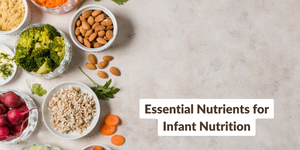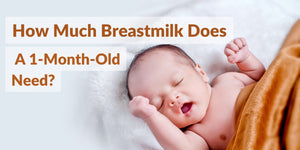One major decision you will have to make for you and your baby is choosing between breastfeeding and bottle feeding. Although breastfeeding is the ideal choice, it may not be possible for all mothers to breastfeed. In such a case, baby formula is a good alternative to provide the nutrients they require.
Which is better?
Between the both, doctors recommend breastfeeding due to several advantages:- Promotes optimal physical and mental growth of the baby and increases intelligence
- Provides the baby with ideal nutrition
- Lowers the risk of allergies, infections, and eczema in the baby
- In the long term, it reduces the risk of diabetes and obesity
- Easier to digest than formula, thus reducing the incidence of constipation or diarrhoea
- Cost-effective, convenient and always available
- Lowers the mother’s risk of anaemia; breast, uterine and ovarian cancers; diabetes; high blood pressure; and heart diseases
- Prevents pregnancy by providing up to 98% protection
- Helps build the mother-baby bond
When is bottle-feeding okay?
Breastfeeding is the best choice for the baby, and you can continue to do so for your baby if you have a minor illness such as a cold. However, you should ask your doctor if you need to formula feed your baby in case of more serious illnesses, like hepatitis, tuberculosis, and human immunodeficiency virus (HIV).
Avoid breastfeeding in the following conditions:
- If you are taking medicines, such as methotrexate, cyclophosphamide, doxorubicin, iodine 131, gallium 67, and indium 111 as these are secreted in the breast milk
- You have breast engorgement, mastitis, abscess and sore and cracked nipples.
- If your baby has a cleft palate that may or may not be accompanied by a cleft lip. If a baby has only a cleft lip, breastfeeding is possible.
- If the baby has metabolic disorders, such as classic galactosemia, maple syrup urine disease and phenylketonuria
- In the case of psychiatric disorders such as postpartum psychosis in the mother.
Breastfeeding can be continued with a few precautions if you have confirmed or suspected COVID-19 that including covering your face with a mask and washing your hands before and after touching your baby.
It can also be a challenge if you have to return to work or any other medical conditions, in which case your doctor can suggest the best.
Am I producing enough milk? Should I give my baby formula?
If your baby gains half a kilogram of weight each month and passes light-coloured urine more than six times a day, it means your baby is getting enough milk. If these parameters are not met, your doctor will check you, your baby, and the way you breastfeed to determine the reason behind this and will counsel you accordingly for any need for formula milk.
Which formula should I give my baby?
Choose a formula that has all the nutrients that your baby needs. Baby formula is usually based on cow’s milk. If your baby has cow's milk allergy or complete lactose intolerance (unable to tolerate the sugar in milk, you can give your baby a soy protein-based formula.
When selecting a formula for your baby, pick one that is iron-fortified as it has all the vitamins and minerals your baby needs.
Precautions when feeding your baby with formula
Your baby's bottle and nipple need to be sterilised before use till your baby is four months old. Use warm, soapy water to thoroughly clean the bottle and nipple and place them in boiling water for at least two minutes.
Always check the temperature of the formula by squirting a few drops on your inner wrist before formula feeding your baby to prevent burning your baby’s mouth.
Prepare fresh formula when your baby is hungry and feed it within an hour. Any formula that is left over after a feed should be discarded.
Breastfeeding should be your first choice. However, if you decide to formula feed your baby, choose the appropriate formula and take the necessary precautions to keep the apple of your eye, safe.
References:
- KidsHealth. Breastfeeding vs. formula feeding [Internet] [Updated Jun 2018]. Available at: https://kidshealth.org/en/parents/breast-bottle-feeding.html#:~:text=Breastfed%20babies%20have%20fewer%20infections,ear%20infections%20. Accessed on Dec 17, 2020.
- Nigam KS. Pediatrics for practitioners. New Delhi: Jaypee Brothers Medical Publishers; 2014. Chapter 3, not enough milk; p. 15–20.
- Koletzko B. Pediatric nutrition in practice. 2nd ed. Basel: Karger; 2015. Chapter 2.2, formula feeding; p. 97–103.
- Anand RK. IAP textbook of pediatrics. 5th ed. Gwalior: IAP, National Publication House; 2013. Chapter 4.2, infant and young child feeding; p. 127–133.
- KidsHealth. Cleft lip/cleft palate: Feeding your child [Internet][Updated on Oct, 2019]. Available at: https://kidshealth.org/en/parents/clefts-feeding.html. Accessed on Jan 13, 2021.
- UNICEF. Acceptable medical reasons for use of breast-milk substitutes [Internet]. Available at: https://apps.who.int/iris/bitstream/handle/10665/69938/WHO_FCH_CAH_09.01_eng.pdf?sequence=1. Accessed on Jan 13, 2021.
- Kaiser Family Foundation. Postpartum psychosis Is real, rare and dangerous [Internet][Updated on Jan 25, 2019]. Available at: https://khn.org/news/postpartum-psychosis-is-real-rare-and-dangerous/. Accessed on Jan 13, 2021.
- Centers for Disease Control and Prevention. Coronavirus disease (COVID-19) and breastfeeding [Internet][Updated on Jun 4, 2020]. Available at: https://www.cdc.gov/breastfeeding/breastfeeding-special-circumstances/maternal-or-infant-illnesses/covid-19-and-breastfeeding.html. Accessed on Jan 13, 2021.
- AboutKidsHealth. Formula feeding when you cannot provide breast milk for your baby [Internet] [Updated Sep 21, 2015]. Available at: https://www.aboutkidshealth.ca/Article?contentid=719&language=English. Accessed on Dec 17, 2020.
- Seattle Children's. Bottle-feeding (formula) questions [Internet] [Updated Aug 14, 2020]. Accessed on Dec 17, 2020.
- KidsHealth. Formula feeding FAQs: preparation and storage [Internet] [Updated Feb 2015]. Available at: https://kidshealth.org/en/parents/formulafeed-storing.html. Accessed on Dec 17, 2020.






LEAVE A COMMENT